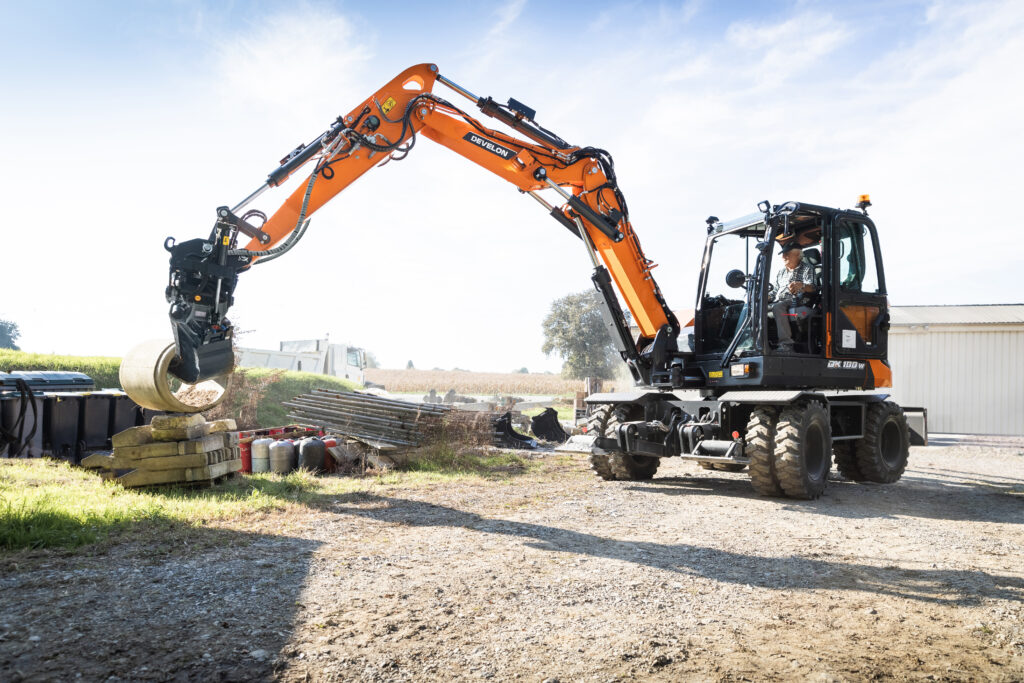Look around your job site and you’ll likely see a need for an accessory that can give you a wider range of motion: a tiltrotator.
A tiltrotator is an advanced hydraulic attachment that connects to a mini or crawler excavator’s arm to help with tilting and rotating work.
Contractors in Europe have used tiltrotators for decades. They are gaining popularity in North America due to various factors and can offer productivity and efficiency gains for mini excavator operators.
Andy Jeong, Mini Excavator Product Manager and Compact Engineer at Develon, dives into the benefits of tiltrotators for mini excavators.
Tiltrotator basics
A tiltrotator accessory for mini excavators is available in three styles: pin-on, quick coupler and quick attachment system. The pin-on style provides good strength and stability, but it is more time-consuming to install. The quick coupler style is the most common method as it allows for quick and easy attachment.
The accessory is mounted between the mini excavator arm and the attachment. It can be connected to the excavator’s hydraulic system through quick couplers or the quick attachment system, allowing it to receive hydraulic power and control signals from the excavator’s cab.
“Think of a tiltrotator like a next-generation quick coupler, allowing the attached bucket or other attachment to tilt from side to side relative to the excavator arm,” Jeong said. “This tilting movement is controlled hydraulically and typically allows for tilting angles of up to 45 degrees in either direction with 360-degree rotation. The operator can adjust the tilt angle from inside the cabin using controls that vary the flow and pressure of hydraulic fluid to the tilt cylinders within the tiltrotator.”
Tiltrotator advantage

A tiltrotator accessory for excavators can enhance the machine’s capabilities by providing both tilting and rotating functions. Here are a variety of benefits of using a tiltrotator attachment.
Increased productivity: With a tiltrotator, you can perform a wide range of tasks that would typically require multiple attachments or machines. Grading, digging trenches, shaping embankments and precise material handling become easier with a tiltrotator accessory.
“Plus, a tiltrotator has a wider range of motion that reduces the need for constant repositioning of the excavator, leading to faster job completion,” Jeong said. “This versatility minimizes downtime and provides a more streamlined process.”
Improved safety: Staying safe on the job site is key whenever operating equipment and attachments. Using a tiltrotator, you can perform tasks from a safer distance, reducing the need for manual handling of materials in hazardous or hard-to-reach areas.
“The ability to manipulate the bucket angle and rotation from the operator’s cab improves visibility and control, enhancing overall safety on the job site,” Jeong said.
Less equipment: A tiltrotator can reduce the need for multiple specialized excavator attachments, thereby streamlining equipment needs on job sites.
“Instead of swapping out various buckets, grapples or other tools for different tasks, operators can use a single attachment,” Jeong said. “By eliminating the need for additional equipment, operators can be more productive, and contractors can optimize their fleet management. This can potentially reduce costs related to equipment acquisition, maintenance and transportation.”
Increased compatibility
Tiltrotators are designed to be compatible with a range of excavator models and sizes as well as attachments, making them versatile additions to fleets. The most common attachments are buckets, grapples, forks and plate compactors.
“Installation involves attaching the tiltrotator to the excavator’s quick couplers and hydraulic lines. This can be a relatively quick setup,” Jeong said. “Always follow the manufacturer’s instructions in the owner’s manual for installation and removal.”
Understand the basics
Understand the controls and capabilities before you use a tiltrotator accessory for a mini excavator. This requires proper training and practice.
“A tiltrotator involves a new set of controller joysticks, so it’s important for operators to spend time learning the basics,” Jeong said.
“Operators usually understand the basic functions within a few days, but it can take several weeks or even months to gain full efficiency. It also depends on the skill level of the operator.”
It’s also beneficial to familiarize yourself with the owner’s manual and the basic operating procedures before using a mini excavator paired with a tiltrotator accessory.
Prior to selecting a tiltrotator accessory, visit with your dealer. They can highlight the features, benefits and compatibility with various excavator models.
“Dealers can help operators choose the right tiltrotator model based on their specific requirements and the types of tasks they perform,” Jeong said.
“Plus, they are there to help answer questions about the tool, including maintenance requirements and warranty coverage. Most importantly, they can explain what service and support users receive with this accessory.”
Manufacturers and dealers back their products with training programs and local assistance. This support can help maximize the effectiveness of your tiltrotator accessory. Contact your local dealer to learn more about this accessory and how it can benefit you on your next job site.
Tiltrotator in action
Jake Eike, Owner of BluGrade Earthworks and Wood Duck Landscapes, was interested in finding a better way to handle excavation and landscaping tasks. So, he went online and came across a highly specialized tool: a tiltrotator.
Eike has paired the tiltrotator with his Develon DX62R-7 mini excavator and a grapple attachment, and he hasn’t looked back.
“I watched videos online of others running the accessory and had to try it out,” Eike said.
“I got the unit, and it’s just unbelievable what it’s done for efficiency for my business.”
Read the full article here